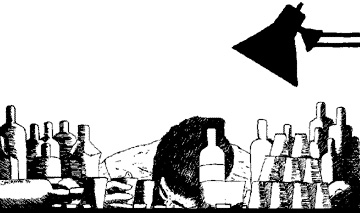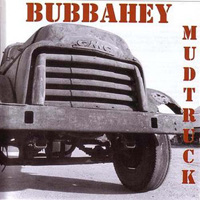 Liquor Lecture
Liquor Lecture
by Lex Marburger
illustration by Chris Sherman
With public interest in mind, we offer a Lollipop Guide to Liquor. Please note: We are trained professionals and the “experiments” that follow are not for “casual” drinkers. Lollipop assumes no responsibility for the actions of any drunk person, including its own staff members. And ask your Mom first, okay?
Drinking Games
I’d like to spend this month talking about a letter I got from Will Tarrent. It goes like this:
“Hello, my name is Will. I drink. Anyhow, over the years I have developed certain guidelines and rules of thumb [for not looking like a fool when drunk]. Nothing major or strict, mind you, just some helpful hints I’ve accumulated over the years. An example would be as follows: At a social gathering, someone suggests a social lubricant – a drinking game! Since everyone in the room went through college, it is assumed that everyone learned something. That something would be Quarters. Everyone gathers around in a circle. Everyone but me, that is.
‘Will, aren’t you going to join us?’ one merry drinker inquires.
My reply is simple but very direct. ‘Nah.’ Rule #17. Don’t play drinking games. They revolve around losing. You drink to win.
It’s guidelines like these that have guided me through the murky haze which I refer to as my adult life. Hopefully your magazine will have some interest in publishing this painfully acquired knowledge.”
Well, Mr. Party Pooper, there are many ways around this quandary. One, change the rules. So, you sink a quarter? You drink, and get another turn, another chance to take a drink! Now you’re playing to win! Two, take on a passive-aggressive mentality. Win by losing. Fail as much as possible, thereby ensuring your inebriation. Three, play a different game, one with a more holistic nature. Like “Up the River, Down the River,” where the hand you are holding can mean either giving or taking drinks, depending on which direction the cards are traveling. However, these Taoist games are rare, so I recommend an amazing little game that can be played in conjunction with any other: Viking! Simply, the game goes like this. One person is the Viking. Another game is played. At any point during the game, if the Viking calls out “Viking!” everyone must cheer, stand, and finish their beer. The last person to finish (or the first, depending on how you want to play), becomes the new Viking. Play resumes on the old game, until the critical moment is reached again. “Viking!”
The skill of the game is to be extremely observant of everyone’s consumption level, and act appropriately. You could either try to sink someone (or bless them, playing to win), or give an equal chance to everyone. As always, timing is the key. You don’t want to make the game boring or redundant, so you wait. Late in the evening, many will forget that Viking is even being played. I’ve played rounds of Viking that lasted half an hour before the hue and cry drowns out the stereo.
Another good game where the corrupt are rewarded is “I Never,” a game of honesty, imagination and social bonding. Going in a circle, each person announces, “I never…” and then proceeds to tell of something they’ve never done (i.e. “I never smacked my mother on the head with a crowbar,” “I never had carnal knowledge of a girl under 18,” etc.). Anyone in the crowd who has performed the act in question takes a drink. Then it’s the next person’s turn. The beauty of this game is not that lowered inhibitions lead to deep secrets, or even that those who have done more drink more (how’s that for winning?), it’s that the players never vocally admit to anything. They simply drink. Yes, there is a chance for the game to turn ugly, but that’s the risk you run when you drink to win.
So Will, there’s a few ideas about how to join a party comfortably and easily. Remember, when you’re drinking, be sociable, otherwise you’re an alcoholic.
Questions, comments, controversy? Rants, raves, redundancy? Send in your drinking stories, tales, myths, fables, and legends to Lollipop and we’ll try to include them in lectures to come.



